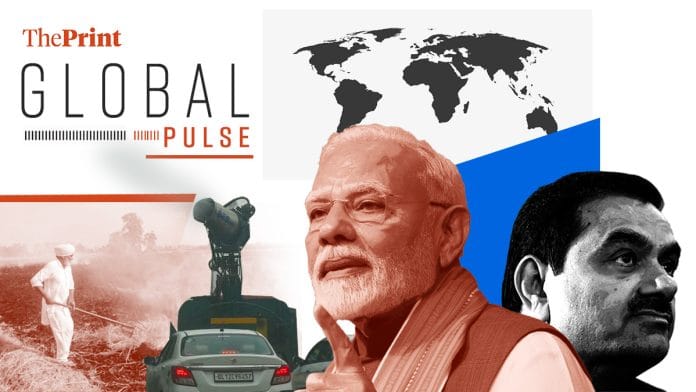New Delhi: This week’s opening of the winter session of parliament should have been on a high for Prime Minister Narendra Modi. If only it weren’t for the American indictment of Gautam Adani, writes The Economist.
The Modi government just won a landslide victory in Maharashtra, following another big win in Haryana last month, but the win is now “almost certain to be eclipsed” by the Adani scandal, the Economist predicts in a story that analyses the most recent electoral developments in Maharashtra and Jharkhand, with a mention of Priyanka Gandhi’s win in Wayanad.
Despite saying it wouldn’t, the BJP’s electoral wins ironically eclipse the Adani scandal in its own story: even The Economist seems unconvinced that Adani’s indictment by American prosecutors over an alleged scheme to give out over $250 million in bribes will truly rock the boat. It all depends on what the Congress does with this news: “It does, however, provide fresh political momentum to India’s opposition alliance,” the Economist says hopefully.
“BJP leaders will no doubt be pleased that their electoral machine appears to be back on track,” the piece ends. “But as the Adani scandal unfolds and rivals jockey for position, Mr Modi’s own political prospects look increasingly problematic.”
Financial Times takes a tougher stance in an editorial. The US charges against Adani is a new test of credibility for India’s political and business establishment, and carries serious repercussions for India’s business reputation.
The editorial opens with a mention of the Hindenburg report’s allegations, which claimed that Adani’s businesses had engaged in stock market manipulation and accounting fraud. The report itself was a test—“but one which it ducked”. India’s response to the fresh set of allegations, this time coming from federal prosecutors in the Eastern District of New York, is going to be very important because “India’s investment case is based not just on its size and impressive growth but on its claim to be a safer alternative to an autocratic China.”
“The country’s political and business elite should treat seriously the accusations now emanating from US legal authorities, and ensure they are properly investigated domestically. While there may be irritation at perceived interference by overseas agencies, that is the price of tapping international investors,” the FT writes.
The allegations show how economic power in India is concentrated within “politically-connected, family-run conglomerates”. And it’s already a huge question mark why American law enforcement is investigating Adani’s bribery charges and not Indian law enforcement.
“Advanced economies have issues with crony capitalism, too,” the FT concedes, pointing to returning US President Donald Trump and his gang of billionaire businessmen. But “such models typically lead to suboptimal growth,” the editorial cautions. What will truly help the Modi government is to make sure the Indian economy—which the piece describes as an emerging powerhouse—has a “sturdy and transparent regulatory and legal environment”. If only the FT would turn its withering gaze towards India’s other institutions too.
The New York Times points to another Indian practice that could benefit from a sturdy and transparent regulatory and legal framework: the uniquely Indian way of kidnapping politicians to force them to defect.
In a long report on resort politics and its specific role in the recent Maharashtra elections, the Times follows the story of one Shiv Sena MLA, Nitin Deshmukh, and how he was kidnapped and held in a luxury Gujarat resort so the government could fall in 2022, paving the way to the Mahayuti alliance. It details the building of the alliance through the bizarre practice of resort politics, highlighting the ruthless opportunism of Indian politicians.
The report says that in several states—Maharashtra, Karnataka, Madhya Pradesh—the BJP “after failing to win power through elections, has gained effective control through similar episodes in which lawmakers were sent to resort hotels until their government fell.”
Resort politics, in fact, is “such a feared practice that mere rumors can send rival parties running to protect themselves”. It goes back decades to when coalition politics began in India, the Times reports, except that during the Congress it was often used not to bring down governments but keep them intact.
The BJP has beefed up the practice with criminal cases, bribes, and threats of unleashing its investigating agencies, the report says. It’s all part of the BJP’s “orchestrated fragmentation of politics” to keep control over state governments.
Meanwhile, the Washington Post reports on India’s terrible air quality as it reached its worst levels in five years—and how a changing practice in rice farming plays a role.
An agricultural mandate meant to preserve groundwater levels by delaying the annual sowing of rice has caused “up to a 20 percent increase in smoke particles in northern Indian cities”, according to a team of researchers.
Delaying the sowing—which is water intensive—until the start of the monsoon season pushes back the harvest and the burning of stubble. This, in turn, combined with changing winds at a later time in the year is what causes smog.
The policy was meant to improve the transition of the agricultural season, but has instead massively affected people’s health. But “despite the evidence, the government officer who drafted the law denies any impact on air pollution,” the Post reports.
He said “the delay in sowing times has not delayed harvests because new rice varieties take less time to mature. If the winds are now carrying smoke over Delhi, it may be due to climate change, he said, not his law,” the report says.
The root might go deeper than just a change in sowing timings. The problem is compounded by a whole host of other things—new farming and irrigation techniques has led to several unsustainable agricultural practices. All creating the perfect toxic storm that is Delhi’s air quality.
Also read: A caste-shaped hole in India Inc’s affirmative action policies & menace of ‘digital arrest’ scam







Only if wishes were horses, all the wishes of Modi haters would be fulfilled and pigs would be seen flying.